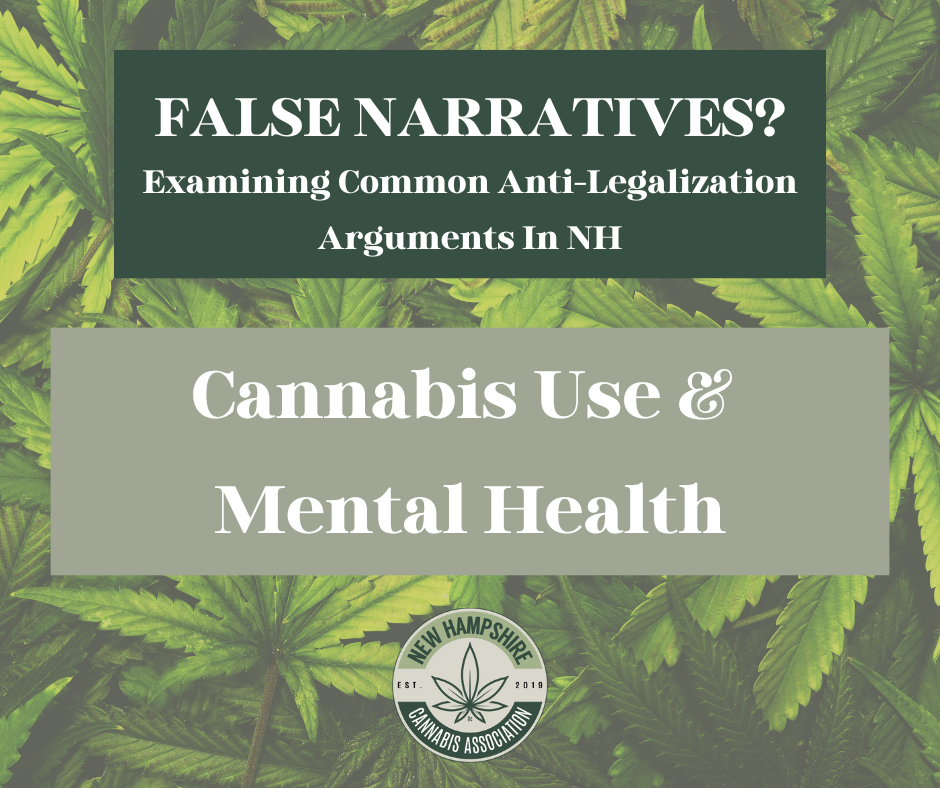False Narratives?: Examining Common Anti-Legalization Arguments in NH (Part 2)
If you have been paying attention to cannabis legalization efforts in the Granite State over the past few years, it is painfully obvious that one of the most significant barriers to successful reform has been the Senate.
Year after year, the House (in alignment with general public opinion) routinely passes cannabis legalization bills, only for them to then die a painful death in the upper Senate chamber due to either (1) a lack of correct information, (2) misinformation, (3) straight up catastrophizing the negative consequences of legalization, or (4) some general combination of all three.
As such, we here at the NH Cannabis Association feel that it is important to try to provide information and research as a means of countering, and hopefully, dispelling those anti-legalization arguments.
In the second article in this series examining these false narratives, we explore the relationship between cannabis and mental health.
Argument #2: Cannabis Use and Negative Mental Health Outcomes
Before diving into some of the specific information out there in relation to this topic, one thing we would like to clarify is the difference between correlation and causation. By definition, correlation does not equal causation. Rather, correlation implies that two things are associated with one another, whereas causation means that one thing causes another thing to occur. In the context of mental health-based arguments opposed to the legalization of cannabis, recognizing this difference in meaning is critical.
If you have tuned in to any of the livestreams of the pubic hearings related to cannabis legislation in the NH House or Senate these past few years, you will likely have heard some public testimony claiming that cannabis use is “linked to” negative mental health outcomes or suicide (especially with youth in the state). Therein lies the rub—just because cannabis use may coincide with mental health issues does not mean that it is causing those issues.
Unfortunately, critics of cannabis legalization in the Granite State continue to push this largely unfounded narrative in order drive public fear of the dangers of cannabis, despite the fact that research suggests that state legalization is not associated with increased mental health disorders or suicide. And this false narrative also ignores the equally plausible scenario that many individuals who are dealing with mental health disorders or suicidal ideation may simply use cannabis as a means of self medication due to a lack of treatment options and resources or in response to the negative stigma society still often attaches to individuals suffering from mental health issues.
Additionally, many of the arguments against legalization do not take into account other variables that could be at play such as poly-drug use, family history, and poverty. So simply denouncing cannabis as a scapegoat in this context is disingenuous at best, and outright fear mongering at worst.
Rather, the complexity of the relationship between cannabis and mental health better serves as an argument for legalization and regulation for a variety of reasons. As we all know, residents of NH are already using cannabis, whether it is being purchased on the black market or from the legal dispensaries in MA, ME, and VT that surround our “island of prohibition”. In this context, legalization provides significant public health benefits especially as it pertains to access and education.
According to an article on NORML’s website, legalization and regulation of cannabis would allow for “better safeguards [to] be enacted restricting adolescents from legal access to it” and that prohibition only serves to undermine the “government’s ability to educate its citizens, particularly young people [and at-risk populations with predisposed medical conditions], to the potential risks of marijuana when and where they present themselves”.
While the above information is only a small slice of the ever-expanding body of information and research regarding cannabis and mental health, we hope it can provide guidance to both advocates and legislators in NH in the coming weeks as the Senate decides whether or not to legalize cannabis in the Granite State.
Here are some additional resources related to cannabis & mental health:
- High Times: Study: No Significant Association Between Cannabis Use, Developing Psychosis
- Ganjapreneur: Study Finds Cannabis Could Reduce PTSD Symptoms
- Journal of American Medical Association (JAMA): State Cannabis Legalization and Psychosis-Related Health Care Utilization



